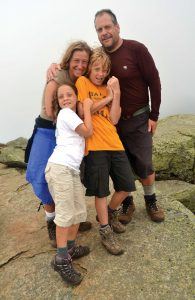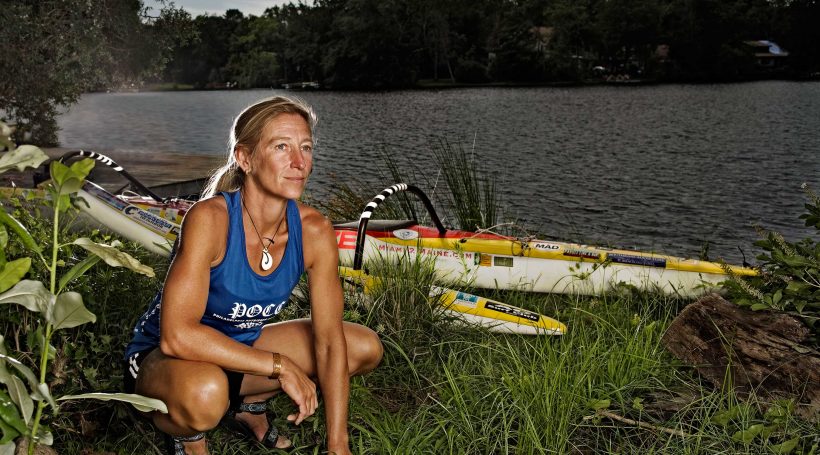Paddling the Willapa Bay near Seattle, Wash. in 2010, Margo Pellegrino found herself in enormous waves breaking up to nine feet high. Alone in her 20-foot canoe, the Medford Lakes mother of two forced herself to stay calm. With keen focus and awareness – and no room for error – she traversed two treacherous miles to calm water. Back on dry land, she started planning her next trip.
A staunch environmentalist, Pellegrino takes annual canoe excursions to raise awareness about environmental issues gravely affecting the earth. Her first trip in 2007 was a two-month excursion from Miami to Maine highlighting water pollution, the excessive amount of coastal development and overfishing. Seven trips and 6,000 miles later, she’s still going strong.
Her ecological causes are vital to our world, she says, like gyres – naturally occurring vortexes of wind and currents where plastic accumulates, threatening ocean life. “Up until recently, these problems were happening relatively slowly, but as population growth increases, it’s going to be happening exponentially faster,” she says.
Pellegrino’s father had a huge influence on his daughter’s environmental activism as she watched him change his mind on climate issues. “It wasn’t until the mid-90s that he stopped being a climate change denier – the science was becoming so much clearer,” she recalls. “What was remarkable was that he was never so grounded in dogma and pride that his views were the be-all and end-all. He could, even in his 60s, change his mind about stuff he once thought to be true.”
So when he died suddenly from a heart attack in 2004 at 67, she was driven to act. “I realized life is so short that if you think you can do something to help others in some way, you should do it as soon as you start thinking about it,” she says. “You honestly don’t know how long we have on this planet.”
Further influenced by the book “Across the Savage Sea” by Maud Fontenoy about the author’s rowing expedition across the North Atlantic, Pellegrino knew what she had to do. But she needed to be prudent and make her efforts count.
“I would love to have an adventure, but I could never put my life at risk when I have children,” she thought. “And why do it just to do it? I would need to attach it to something that would help. If we take care of the ocean, that benefits the most amount of people.”
For each excursion, Pellegrino focuses on one or more environmental issues, whether it’s taking water samples for testing or cleaning up trash. She contacts other environmental groups on the ground who can help get the word out, as well as offer some companionship. Paddling solo for an extended period of time can be lonely, and seeing trash in the water can be depressing, she says.
She clings to the success stories where polluted waterways have been saved, like the north branch of the Rancocas Creek, one of her favorite spots to row. “People would get typhoid from the water, but now 100 years later things have been cleaned up,” she says. “We threaten to undo ourselves again, because there’s a lot of unregulated compounds and hormones appearing in our water. That can be remedied, but it’s not going to get better if we don’t realize there’s a problem.”
For Pellegrino’s most recent trip, paddling from Newark to New York City to Chicago, she trained three to four days a week for up to 8 hours a day. So much exercise requires lots of eating to maintain her weight. That can be challenging. “I actually get sick of eating,” she says.
Pellegrino left Newark on May 20 and expects to return this month. She hopes to showcase the need for strong measures to protect our water and to highlight other environmentalists who are working to remedy some of the problems.

Pellegrino with her husband Carl and children Julia, 10, and Billy, 13
Pellegrino raised the roughly $25,000 cost of the trip through a crowdfunding site, but admits fundraising is not one of her favorite things. Leaving her family for an extended period of time is also difficult, but her husband and kids, ages 13 and 10, have visited her along the way.
“They are extremely supportive, though I don’t know if they’re proud of me or think crazy mom is doing crazy things again,” she jokes. “I think they actually like the break from me too.”
Pellegrino usually anticipates some scary moments on every trip. “What will be will be,” she reasons. “The only thing I can control are my reactions to what is going on around me. The number-one rule is to never, ever panic. Training is a huge part of it, not just for the physical aspect but for the mental aspect, too.”
But her biggest worry has nothing to do with the logistics or potential danger. It’s convincing herself she is making a difference.
“Sometimes I wonder, ‘Am I really being effective?’” she says. “But any time you get people to really think about these issues it’s a good thing. I do think people are starting to get it, though I don’t know if all the connections are being fully made, especially our environment’s impact on our individual health. But there is a growing awareness that we cannot keep doing the same things, because there is going to be suffering.”












